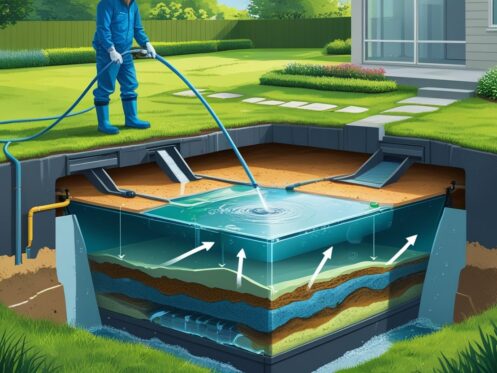Cleaning your septic tank without pumping is not only possible, but it can also save you time and money. Using natural bacteria and enzymes, you can maintain a healthy septic system effectively without the need for expensive pumping services. Many homeowners are unaware that simple household ingredients, such as baking soda, can aid in this process, ensuring your system functions optimally.
At Splash Plumbing, we understand the importance of maintaining your septic system. Regular, proper care can significantly extend the life of your tank and prevent costly repairs. With the right methods, you can reduce the accumulation of waste and improve the efficiency of your septic tank.
Taking proactive steps to clean your septic tank naturally can simplify your home maintenance routine. Trust the expertise of professionals to guide you through the process, ensuring that your system operates efficiently for years to come.
Understanding Your Septic Tank and Its Components
Taking the time to understand your septic tank and its components is essential for maintaining a healthy wastewater system. This knowledge can help you address issues promptly and enhance the longevity of your septic system.
How Septic Tanks Work
A septic tank is a crucial part of your home’s wastewater system. It treats raw sewage by using natural processes. When wastewater enters the tank, it separates into three layers: solids settle at the bottom, liquids form the middle layer, and scum floats on top.
Bacteria naturally present in the tank help break down solid waste over time. The liquid effluent then flows to the drain field, where it further filters through the soil before returning to the groundwater. Regular maintenance and understanding how your septic system operates are vital in preventing backups and failures.
Key Septic System Components
Your septic system consists of several key components that work together to treat and disperse wastewater:
- Septic Tank: This is where the initial treatment of sewage occurs. It holds waste and allows for bacterial digestion.
- Drain Field: This area allows treated liquid to seep into the ground, filtering out impurities as it passes through the soil.
- Pipes: A network of pipes transports wastewater from your home to the septic tank and then to the drain field.
- Soil: The natural filtration provided by soil is essential for the final treatment of wastewater.
Understanding these components can not only help you maintain the system more effectively but also assist in identifying potential issues. If you’re experiencing problems, consider contacting professionals like Splash Plumbing for expert assistance in your area.
Signs Your Septic Tank Needs Cleaning
Recognizing the signs that your septic tank requires cleaning is crucial for maintaining a functional wastewater management system. Not addressing issues promptly can lead to serious problems, including costly repairs or backups. Pay attention to the following indicators.
Foul Odors and Reduce Odors
One of the most immediate signs that your septic tank needs attention is the presence of foul odors around your property. This unpleasant smell may indicate that gases are escaping from your septic tank, a clear sign of failure in the system.
If you notice a strong, sewage-like smell, it’s important to investigate quickly. These odors can also seep into your home, making the living environment uncomfortable and potentially hazardous. Using natural deodorizers can help reduce odors temporarily, but this does not address the underlying issue. Timely maintenance can prevent more severe complications, allowing you to enjoy a clean and odor-free environment.
Gurgling Sounds and Slow Drains
You may hear gurgling sounds from your drains or toilet, which often signals that your septic system is not functioning properly. These noises suggest that wastewater is struggling to exit through the pipes, often due to a clog or backing up of the septic system.
Additionally, if you experience slow drainage in sinks, bathtubs, or toilets, this could signify that your septic tank is nearing capacity. Slow drains can often lead to bigger problems like blockages, which may require professional intervention. Regular maintenance can help you avoid these issues.
Sewage Backups and Slow Drainage
Sewage backups are an unmistakable sign that your septic tank needs immediate attention. Raw sewage backing up into your home can create health hazards and lead to significant damage. If you experience this, it’s critical to call a professional service such as Splash Plumbing right away.
Slower drainage over time can also be a precursor to backups. If you find that multiple fixtures in your home drain sluggishly, this indicates a widespread issue within the septic system. Consistent monitoring can help prevent these issues, allowing your system to function smoothly and reducing the need for costly repairs.
Alternative Methods to Clean a Septic Tank Without Pumping
Maintaining a septic tank without professional pumping can be accomplished through various methods. These alternative techniques can help you manage sludge accumulation while promoting a healthy septic system. Here are some effective approaches.
Beneficial Bacteria and Enzyme Additives
Using beneficial bacteria and enzyme additives is an effective way to maintain your septic tank. These products help break down organic matter in the tank. By introducing healthy bacteria into your system, you can enhance the decomposition process, reducing the buildup of sludge.
Many commercial products are available, specifically designed for septic maintenance. They often contain a mix of enzymes and bacteria that digest waste, promoting a more efficient breakdown. When selecting a product, ensure it’s septic-safe to avoid harming your system.
Splash Plumbing recommends checking labels for specific bacterial counts and adherence to environmental standards to ensure effectiveness. Incorporating these additives regularly can greatly reduce your need for more invasive cleaning procedures.
Natural Cleaning Products
Utilizing natural cleaning products is a great alternative to harsh chemicals. Vinegar, baking soda, and essential oils can help maintain a clean and functioning septic system without disrupting the balance of bacteria.
Vinegar acts as a natural disinfectant, while baking soda can neutralize odors and improve the environment within the tank. Essential oils like tea tree oil may have antibacterial properties that can aid in keeping your septic tank clean. These products prevent harmful chemicals from entering your system, reducing the risk of damage.
Integrating these natural alternatives into your household cleaning routine can support your septic tank’s health and minimize the need for pumping.
Baking Soda and Vinegar Solutions
Combining baking soda and vinegar provides an effective and eco-friendly solution for maintaining your septic tank. This powerful duo produces a reaction that can help break down minor blockages within your pipes and promote a healthier environment.
To use this method, pour half a cup of baking soda followed by half a cup of vinegar into the toilet or sink connected to the septic system. Allow the mixture to sit for at least 30 minutes before flushing with water. This approach can help dislodge debris and reduce buildup.
Regularly using this method can not only assist in cleaning your septic tank but also enhance the overall plumbing in your home without the need for extra pumping.
Septic-Safe Cleaning Products
It’s vital to select septic-safe cleaning products for your household cleaning routine. Many conventional cleaning agents can harm the beneficial bacteria in your septic system, leading to costly consequences.
Opt for products labeled as biodegradable and septic-friendly. These are designed to clean effectively while maintaining the essential bacteria balance in your tank.
Common examples of septic-safe cleaning products include enzyme-based cleaners and natural surface cleaners. Always read the labels carefully to verify that the products aren’t harmful to your plumbing. Being mindful of your cleaning choices can significantly impact the need for septic maintenance.
By implementing these methods, you can effectively clean your septic tank without the frequency of pumping. For personalized advice or assistance in maintaining your septic system, consider reaching out to professionals like Splash Plumbing.
Promoting a Healthy Septic Environment
Maintaining a healthy septic environment is crucial for the longevity of your system. By focusing on the natural bacteria in your tank, avoiding harmful substances, and understanding the role of anaerobic bacteria, you can ensure your septic system operates efficiently.
Maintaining Natural Bacteria Balance
Maintaining a balance of natural bacteria is vital for effective waste breakdown in your septic tank. These beneficial bacteria thrive on organic matter and play a key role in decomposing waste products. To support this environment, regularly add natural additives like enzymes or probiotics. These substances help enhance bacterial activity, ensuring efficient waste digestion.
Regular household practices also impact bacterial health. For example, limit the use of harsh soaps and detergents, as they can disrupt the bacterial balance. Instead, choose eco-friendly products that are less harmful. Remember, a strong community of healthy bacteria directly contributes to the overall health of your septic system and minimizes the need for pumping.
Avoiding Chemical Cleaners and Non-Biodegradable Items
Chemical cleaners can severely harm the natural bacteria essential for septic system operation. Many household products contain chemicals that can disrupt bacterial communities, leading to system failures. It’s crucial to avoid these cleaners in favor of natural alternatives that maintain septic health.
In addition to harmful cleaners, steer clear of non-biodegradable items. Items such as feminine hygiene products, diapers, and certain cleaning wipes can clog your system and hinder waste breakdown. Always dispose of such items in the trash instead of flushing them. By doing so, you protect not only your septic system but also the environment.
Role of Anaerobic Bacteria
Anaerobic bacteria are essential in maintaining the balance of your septic system. These microorganisms operate without oxygen and break down waste more slowly than aerobic bacteria. However, they are incredibly effective at digesting organic matter in a septic tank environment.
The presence of anaerobic bacteria is crucial for keeping solid waste manageable at the bottom of the tank. It’s important to monitor your tank’s biological activity. Regularly inspect your system for signs of sludge buildup. If you notice significant accumulation, consider contacting professionals like Splash Plumbing for guidance on maintaining a healthy anaerobic environment. This proactive approach can prevent costly repairs down the line.
Proactive Septic System Maintenance Tips
Maintaining your septic system proactively can extend its life and prevent costly repairs. Understanding specific techniques can help ensure your system operates efficiently.
Routine Septic Tank Treatment
Regular treatment of your septic tank is crucial. Using enzymes and bacteria products can break down waste effectively. These treatments help maintain the balance of your septic system and reduce the need for pumping.
Aim to treat your tank every few months. Check local guidelines for recommended products, and consult professionals for the best options. Avoid harsh chemicals as they can disrupt the microbial balance. By implementing routine treatment, you can promote effective wastewater treatment.
Using Low-Flow Toilets and Water Conservation
Installing low-flow toilets is a simple change that can significantly benefit your septic system. Traditional toilets consume a lot of water, which can overload your system. By switching to low-flow options, you reduce water usage and help maintain the right balance in your septic tank.
Additionally, practicing water conservation habits—like fixing leaks and using water-efficient appliances—can further minimize the strain on your septic system. Consistent attention to your water usage can enhance the overall performance of your septic system.
DIY Septic Tank Maintenance Techniques
You can perform several maintenance techniques to keep your septic system in check. Regular inspections are key; check for signs of trouble such as slow drainage or foul odors.
Consider creating a maintenance schedule that includes pumping when necessary and using septic-safe cleaning products. You can also add beneficial bacteria to your system to promote healthy microbial activity. Be proactive about removing non-biodegradable items from your system.
For expert advice tailored to your needs, consider reaching out to specialists at Splash Plumbing. They offer a variety of solutions to optimize your septic tank maintenance.
Frequently Asked Questions
Maintaining a septic tank without pumping requires knowledge of effective methods, bacteria management, and cost-effective solutions. Below are some common questions and answers that can help you understand how to manage your septic system properly.
What methods are effective for cleaning a septic tank naturally?
Several natural cleaning methods can help maintain your septic tank. Utilizing beneficial bacteria from natural products can promote the breakdown of waste. Composting biodegradable materials and minimizing harsh chemical use are also vital to preserving the bacteria essential for healthy septic function.
Can increasing bacteria in a septic tank improve its function and reduce the need for pumping?
Yes, introducing beneficial bacteria can enhance your septic system’s efficiency. Products that contain live bacteria can help break down organic matter more effectively, potentially reducing the frequency of pumping. Regularly adding these products can contribute to maintaining a balanced environment in your tank.
Are there any affordable solutions for managing septic tank sludge accumulation?
Affordable solutions include using organic materials such as yeast and enzymes to aid in waste breakdown. Regular maintenance through simple practices like reducing water usage and avoiding chemical cleaners can also help manage sludge buildup, minimizing the need for costly pumping.
What symptoms indicate a septic tank may be approaching full capacity?
Signs that your septic tank might be nearing full capacity include slow drains, foul odors around the drain field, and pooling water above the tank. If you notice these symptoms, it may be time to assess your tank’s condition and consider alternative cleaning options.
How can you safely use household products without disrupting septic tank processes?
Use environmentally friendly and biodegradable cleaning products to avoid disrupting the bacterial activity in your septic system. Limit the use of harsh chemicals like bleach and antibacterial soaps, as these can kill beneficial bacteria necessary for waste breakdown.
Is it possible for homeowners to perform septic tank maintenance independently?
Homeowners can conduct some basic maintenance tasks, such as monitoring drain performance and observing any unusual symptoms. However, while you can manage some aspects independently, professional service may still be necessary for thorough inspections and cleaning. Contact Splash Plumbing if you need expert assistance in maintaining your septic system.












